RIO DE JANEIRO, BRAZIL – The Central Bank acted fast, and Brazil will control inflation earlier than advanced countries, said yesterday the Minister of Economy, Paulo Guedes, in the Invest in Brazil event, held by Apex Brasil.
He stated that the country is prepared to do the fight from the institutional point of view. On the other hand, he acknowledged that the tax reform should no longer advance in Congress. “I don’t know if it will move forward. I don’t think so. It’s politics,” he justified, without giving more details.
He also attributed to politics the noises that involve the management of public spending in Brazil. Speaking to an audience of investors in the real estate sector, he denied that the government has lost control over them and asked for attention to signals instead of noise.

The signs, in this case, are numbers. Guedes informed that when Jair Bolsonaro’s government began, government spending was around 19.5% of Gross Domestic Product (GDP).
With the pandemic, the bill went to 26% of GDP. This year, it has returned to 19.5% of GDP. “No country in the world has made such a strong fiscal contraction.”
By the end of 2022, the expenditure projection was at 17.5% of GDP. With the arrival of the Court-ordered debt Amendment (PEC) and the decision to strengthen the Brazil Aid program, adjustments were made to bring the bill to 18.5% of GDP, the minister projects. In other words, the government will end up with a lower level of spending than when it started.
Furthermore, Brazil has already contracted nearly R$600 (US$110) billion in investments, linked to concessions made in recent years. Guedes cited this data to confront the estimates of a retraction in the economy next year.
He acknowledged, however, that it would be a challenging year, with the effects of inflation still present. He highlighted the “depoliticization of the currency” with the approval of the law that establishes the independence of the Central Bank, and the fact that the 2022 elections will take place for the first time under this new institutional framework.
Inflation will be a “big problem” for the world in the next ten years, said Guedes.
He cited predictions made by former Federal Reserve Chairman Alan Greenspan in his book “The Age of Turbulence” that inflation would rise in the 2020s, particularly in the US.
The process would be explained by the retirement of the baby boomers and the return of Chinese capital to its home country to finance its growth. He commented that interest rates would rise, and the Fed would need to be awakened, as it is now asleep at the wheel.
The situation recommends ensuring fiscal control, he said. “Take care, be responsible, and help us,” he urged. Brazil, he said, will be the largest and most diversified investment frontier in the coming years. “We are open for business,” he said.
Guedes lamented the lack of tax reform since one of its objectives would be to align the tax policy with that of the Organization for Economic Cooperation and Development (OECD) countries.
According to him, corporate taxation in Brazil is high compared to the average of the organization’s member countries. At the same time, dividend distribution is not taxed by Brazil, which disagrees with the world standard.
He told investors that the reform proposal received more than 400 favorable votes in the House but “unfortunately” got stuck in the Senate.

